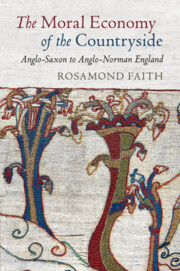Book contents
- Reviews
- The Moral Economy of the Countryside
- The Moral Economy of the Countryside
- Copyright page
- Contents
- Preface
- Abbreviations
- 1 Introduction: The Moral Economy
- Part I Rank
- Part II Reciprocity
- Part III Reputation and Witness
- Part IV The Wolf Sniffs the Wind
- Part V The Aftermath of Conquest
- Part VI In the World of the Manor
- 13 Establishing Custom
- 14 Thinking Feudally
- 15 From Rank to Class
- 16 Conclusion: Forward into the Past
- Appendix The Family Farm in Peasant Studies
- Bibliography
- Index
14 - Thinking Feudally
from Part VI - In the World of the Manor
Published online by Cambridge University Press: 25 October 2019
- Reviews
- The Moral Economy of the Countryside
- The Moral Economy of the Countryside
- Copyright page
- Contents
- Preface
- Abbreviations
- 1 Introduction: The Moral Economy
- Part I Rank
- Part II Reciprocity
- Part III Reputation and Witness
- Part IV The Wolf Sniffs the Wind
- Part V The Aftermath of Conquest
- Part VI In the World of the Manor
- 13 Establishing Custom
- 14 Thinking Feudally
- 15 From Rank to Class
- 16 Conclusion: Forward into the Past
- Appendix The Family Farm in Peasant Studies
- Bibliography
- Index
Summary
Holding land ‘in fee’ was an idea central to the Normans. A fee was land which was part of a relationship to which tenure was central. Land in ‘fee simple’ was ‘land held hereditarily, by service’. This chapter looks at how these feudal ideas played out in the English countryside. After the Conquest a link was being established between tenure and doing ‘homage’ for land. and there is an ongoing debate over whether this was expressed in the Oath of Salisbury, and whether there was a connection between the Oath and the Domesday survey. The second part of the chapter is an enquiry into the means by which peasant tenures too became ‘feudalised’. Courts, and what a court consisted of, were changing. Before the Conquest the hundred and the shire, were the proper forum in which to settle disputes but for Norman lords taking over English lands jurisdiction over one’s ‘men’ was a valuable part of what lordship entailed. The procedures and vocabulary of hallmoots and manor courts show that, while incorporating the ideas inherent in feudal tenure, they retained something of the early notions of dispute settlement.
- Type
- Chapter
- Information
- The Moral Economy of the CountrysideAnglo-Saxon to Anglo-Norman England, pp. 184 - 196Publisher: Cambridge University PressPrint publication year: 2019

